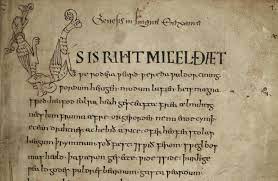Old English, also known as Anglo-Saxon, is the earliest form of the English language that was spoken and written in parts of what are now England and southern Scotland between the 5th and the 11th centuries. Old English is the predecessor of Middle English and Modern English, but it is vastly different from the English we use today. The study of Old English is essential for understanding the development of the English language and the cultural heritage of early medieval England.
In order to fully comprehend the significance and impact of Old English, it is crucial to delve into its historical context. Old English emerged from the Germanic dialects of the Angles, Saxons, and Jutes who settled in Britain after the decline of Roman rule in the 5th century. These tribes brought their languages with them, which eventually merged to form what we now know as Old English. The language underwent several changes over the centuries due to various historical events, such as the Viking invasions in the 9th and 10th centuries, which resulted in the incorporation of Norse words into the English vocabulary.
Key figures in the development of Old English include Caedmon, an early English poet whose hymn is one of the oldest surviving examples of Old English poetry. Another notable figure is King Alfred the Great, who played a crucial role in promoting literacy and education in Anglo-Saxon England. Alfred established a court school to foster the study of Latin and Old English among his nobility, ensuring the transmission of knowledge and culture in the region.
The impact of Old English on the English language cannot be overstated. Many words and phrases in Modern English have their roots in Old English, and the grammar and syntax of Old English have significantly influenced the structure of the language. Studying Old English provides insights into the evolution of English vocabulary, grammar, and pronunciation, as well as the cultural and societal norms of the time.
Influential individuals who have contributed to the field of Old English scholarship include J.R.R. Tolkien, a renowned philologist and author of ‘The Lord of the Rings’ trilogy. Tolkien’s expertise in Old English literature and language informed his creation of fictional languages, such as Elvish, in his works. Another influential figure is Dorothy Whitelock, a historian and scholar who made significant contributions to the study of Old English history and literature.
From a positive perspective, the study of Old English allows us to appreciate the richness and complexity of the English language and its cultural heritage. It provides a window into the lives and beliefs of early medieval English society, shedding light on their values, traditions, and worldview. Furthermore, understanding Old English can deepen our appreciation for literary works from this period, such as Beowulf, The Dream of the Rood, and The Wanderer, which offer insights into the literary and artistic achievements of early English writers.
On the other hand, there are challenges and limitations in studying Old English. The language itself is vastly different from Modern English, with a complex grammar, extensive inflections, and unfamiliar vocabulary. This can make it difficult for modern readers to access and comprehend Old English texts without specialized training and guidance. Additionally, the scarcity of original manuscripts and the fragility of existing sources pose obstacles to conducting in-depth research on Old English literature and history.
Looking towards the future, the field of Old English scholarship is likely to continue evolving as new technologies and methodologies are applied to the study of the language and its cultural context. Digital tools, such as online databases, text analysis software, and virtual reality platforms, offer innovative ways to explore and engage with Old English texts and artifacts. These advancements may facilitate greater access to Old English resources and foster international collaborations among scholars, leading to new insights and discoveries in the field.
In conclusion, Old English is a vital and fascinating area of study that offers valuable insights into the development of the English language and the cultural heritage of early medieval England. By exploring the historical context, key figures, impact, and influential individuals in the field of Old English, we can deepen our understanding of this rich linguistic tradition and its enduring legacy. While there are challenges and limitations in studying Old English, the field is poised for future developments that promise to expand our knowledge and appreciation of this ancient language and its literary treasures.



